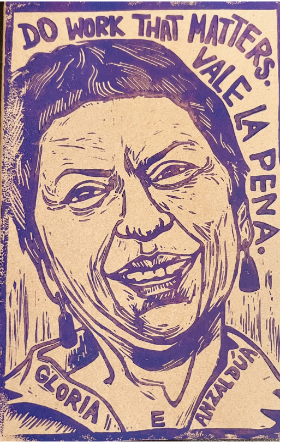Literacy Research that Matters
|
“May We do the Work that Matters. Vale La Pena, it’s worth the pain” ~Gloria Anzaldúa

Chicana feminist Gloria Anzaldúa wrote, “May we do work that matters. Vale la pena, it’s worth the pain.” Anzaldúa’s words remind us of our inner strength, resiliency, and power as a community. As we take the many lessons of the last four years, witnessing and experiencing racial injustice, living during the Covid-19 pandemic, the hostile political climate, teaching remotely, finding new ways to connect, and dreaming of new futures, we invite you to ask yourself, “What is the work that matters? What is the work that sustains you? What is the legacy that you seek to leave for future generations?"
We envision the 2024 NCTEAR conference as the opportunity to reconnect as a community of educators and literacy researchers – “an interweaving of all the minds and hearts and life forces to create the collective dream of the world” (Anzaldúa, 2015, p. 22) that we seek to co-construct alongside children, youth, teachers, families, communities, and each other. The literacy research that matters in this moment calls for a “radical shift” in epistemological, theoretical, and pedagogical perspectives. It calls for research that challenges book bans, narratives of learning loss, anti-LGBTQIA laws, scripted curriculum, linguistic violence, and autonomous models of literacy. It is a praxis that vale la pena, rooted in joy and necessary for transforming our world.
Together, we envision sharing Literacy Research that Matters, the work that will dismantle oppressive structures and lead to more socially just futures.
We envision the 2024 NCTEAR conference as the opportunity to reconnect as a community of educators and literacy researchers – “an interweaving of all the minds and hearts and life forces to create the collective dream of the world” (Anzaldúa, 2015, p. 22) that we seek to co-construct alongside children, youth, teachers, families, communities, and each other. The literacy research that matters in this moment calls for a “radical shift” in epistemological, theoretical, and pedagogical perspectives. It calls for research that challenges book bans, narratives of learning loss, anti-LGBTQIA laws, scripted curriculum, linguistic violence, and autonomous models of literacy. It is a praxis that vale la pena, rooted in joy and necessary for transforming our world.
Together, we envision sharing Literacy Research that Matters, the work that will dismantle oppressive structures and lead to more socially just futures.